
New Audio Experience: Awaken Your Soul and Remember Who You Are
10 SEO Writing Tips for Meditation Teachers and Spiritual Content Creators To Manifest Higher Rankings & Conversions
Anthony V. Lombardo

The immediacy of social media has spoiled us.
As a meditation teacher or spiritual content creator, it’s all too easy to focus on churning out content day after day on a social platform, trying to reach as many people across the world as quickly as possible — all with the hopes that they turn into students or clients.
Who can blame us?
However, I am often surprised by how many meditation teachers completely ignore building their authority organically through SEO. While it takes time, SEO can evolve into a huge channel for exposure and traffic to your courses, coaching programs, and other high-value content. All it takes is a little patience and being intentional with certain aspects of your writing.
After spending years helping small business owners build and rank their websites on Google, I compiled my top ten SEO copywriting tips and tailored them specifically for meditation teachers and spiritual content creators. You can use this guide when writing blog posts, guides, and other resources for your website (or here on Medium) or when creating specialized services and product pages.
These 10 tips are from my SEO Content Bundle specifically designed For Meditation Teachers & Spiritual Content Creators. Download today and get a 66% discount. It includes:
1. Write for Human Beings First
One of the most important SEO copywriting rules is to prioritize writing for human readers first. Although good SEO can help more people find your meditation and spiritual content, it must truly resonate with and engage human readers to make an impact. After all, Simply ranking high won’t positively impact your mission if it doesn’t convert visitors into students, clients, or community members.
Tips For Writing People First Content
- Make your content easy to read through clear, concise sentences and digestible sections that allow readers to navigate your wisdom effortlessly.
- Get to the point. In a world of content overload and limited attention spans, people don’t have the luxury of time to sift through excessive words. Ensure that your content surfaces your core teachings quickly and prominently. This approach minimizes the chances of people leaving your website prematurely and encourages users to stay on your page longer.
- Create comprehensive spiritual resources. Strive to provide in-depth and comprehensive answers to your target audience’s questions. By offering valuable insights and information, you establish yourself as an authority on a topic. This builds trust and credibility with readers.
Keep the needs of these soul searchers at the center of your writing process. Help them cut through the noise to find your teachings and meaning that resonates deeply. This earns organic authority and visibility over time.
2. Research Keywords to Resonate with Spiritual Seekers
Another important aspect of SEO copywriting is getting into the habit of always performing keyword research.
Keyword research is the practice of identifying phrases and words (search terms) your target audience uses when looking for something online.
As a meditation teacher or spiritual content creator, conducting keyword research will benefit your content planning in two primary ways:
- It reveals how many people actively use meditation- and spirituality-related search terms, and subsequently how much competition you face to rank for those specific terms.
- It generates keyword ideas and helps you identify the questions spiritual seekers are searching for in relation to topics like meditation, spiritual growth, manifesting, mysticism, astrology, etc.
Metrics To Consider
In most cases, here are the fundamental search metrics you should understand when planning your content:
- Search Volume: This indicates the level of demand for a specific keyword. It helps you understand how often users are searching for that term.
- Keyword/SEO Difficulty: This assesses the ease or difficulty of ranking for a chosen keyword on a scale of 0 to 100. The higher the value, the more difficult it will be.
Long-Tail Keywords Strategy
Because the latest data shows that 92% of all keywords entered into search engines are multi-word phrases, targeting long-tail keywords is a good strategy.
Unlike generic keywords, as the name suggests, long-tail keywords are longer and contain more specific phrases. They provide various benefits, including lower competition, higher conversion rates, and better alignment with user intent.
For example, instead of searching for the broad keyword “meditation,” a user might search for a long-tail keyword like “guided meditation for a highly sensitive person.” Instead of searching for “stoic wisdom,” a user might search for something more specific like “stoic wisdom for hard days.” These specific phrases indicate the user’s intention and the type of guidance they’re looking for. Gear your strategy accordingly.
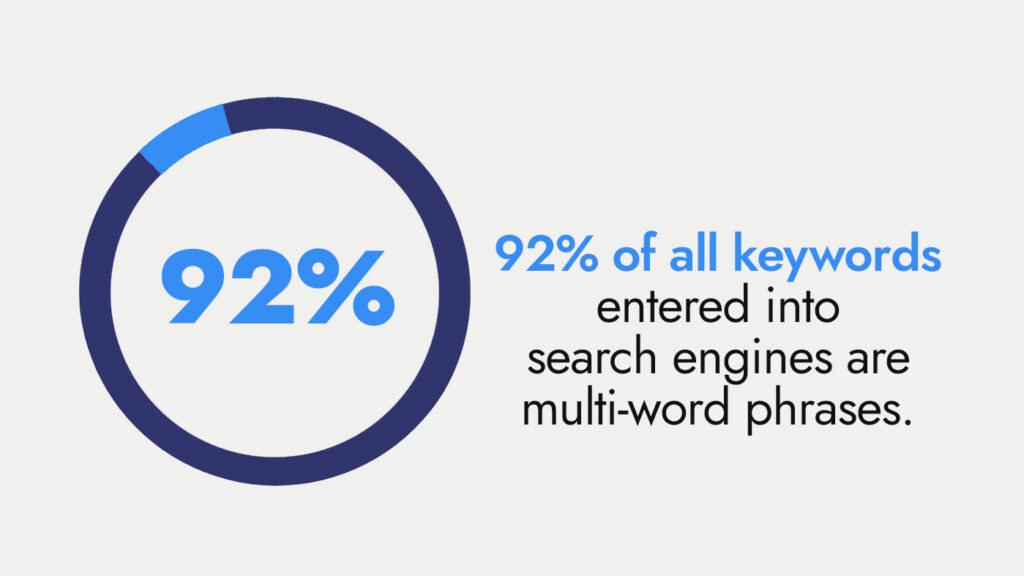
How To Do Basic Keyword Research
Doing effective keyword research as a meditation teacher or content creator doesn’t require you to be an expert in keyword planning and analysis. Nor does it require you to learn how to use industry-standard keyword research tools. While these tools are immensely powerful, there are numerous free tools to perform basic keyword planning that will fit your needs when preparing your content.
To do basic keyword research, you can start by installing a Chrome extension like Ubersuggest or Keyword Surfer. These tools will give you instant keyword data every time you perform a Google search directly on the search results page.
Here are some other helpful keyword tools to consider:
- Using Google’s free Keyword Planner and Google Trends
- Ahref’s free keyword generator
- Semrush free Keyword Magic Tool
- AnswerThePublic.com
- Keyword Sheeter
- QuestionDB
Additionally, to find keyword ideas, you can:
- Do a Google search for a keyword related to your topic and observe the “People Also Ask” section that appears on search results pages
- Use the autocomplete feature in the Google search bar. Simply type in a keyword or phrase and see what related phrases auto-populate.
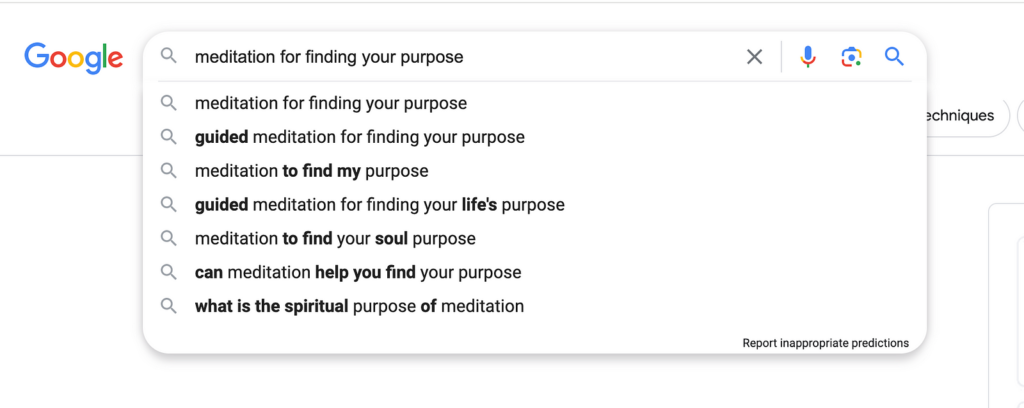
Don’t get lost in the sauce.
Keyword research can seem overwhelming and you can easily get lost going down a rabbit hole. The goal here is to get a clear idea of what primary key term you are going to tailor your content around before creating your website content.
3. Master Search Intent: Understand the Intent Behind Spiritual Searches
To create content that resonates with and attracts spiritual seekers, you need to comprehend the intent and motivation behind their searches. To do this, you need to know the reason why a user is performing a particular search. What is their motivation? Why are they using the particular keywords they input into the search bar?
Additionally, Google heavily leans on search intent when ranking content, making it a critical element of the SEO content writing process.
By understanding search intent, you can create content that aligns with what users are searching for, leading to improved SEO metrics such as clickthrough rate, time spent on page (dwell time), and page views. This means not only higher engagement and conversions, but it signals to Google your content is valuable and relevant. And when Google receives such signals, it views your page (and your website) as authoritative and trustworthy on the topic, which increases your ranking.
While it may sound complicated, figuring out search intent is quite easy.
Three Ways to Decipher Search Intent (without a Paid Tool):
- Analyze Google’s Autocomplete Feature: As shown in the previous section on keyword research, start typing your target keyword into Google’s search bar, and you’ll see a dropdown list of suggested queries. These suggestions are based on popular searches related to your keyword, giving you insights into common search intents.
- Study “People Also Ask” and “Related Searches” Sections: These sections on a Google search results page provide additional questions and related topics that users commonly search for. By exploring these sections, you can understand the different angles and aspects of the intention behind a given query.
- Analyze Search Results: Examine the top-ranking pages that appear in the search results for your target keyword. Analyze the content, headlines, and structure of these pages to identify common themes and patterns. Understanding the type of content deemed relevant and valuable by Google can help you align your own content with the desired search intent.
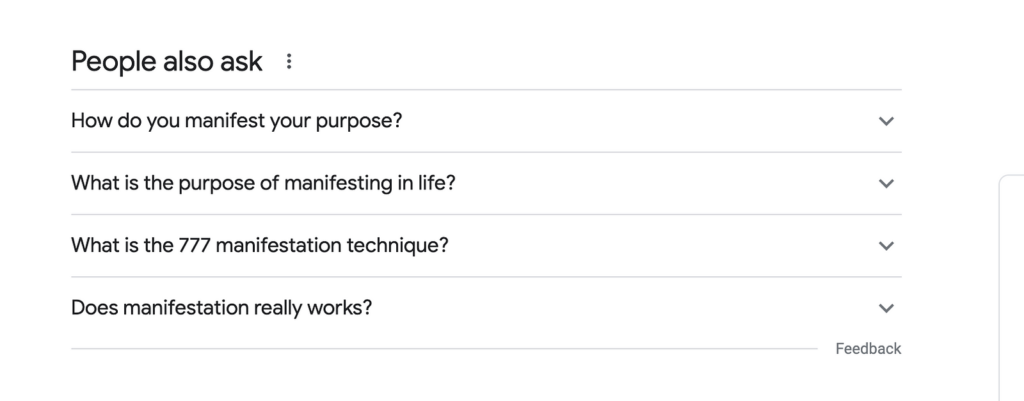
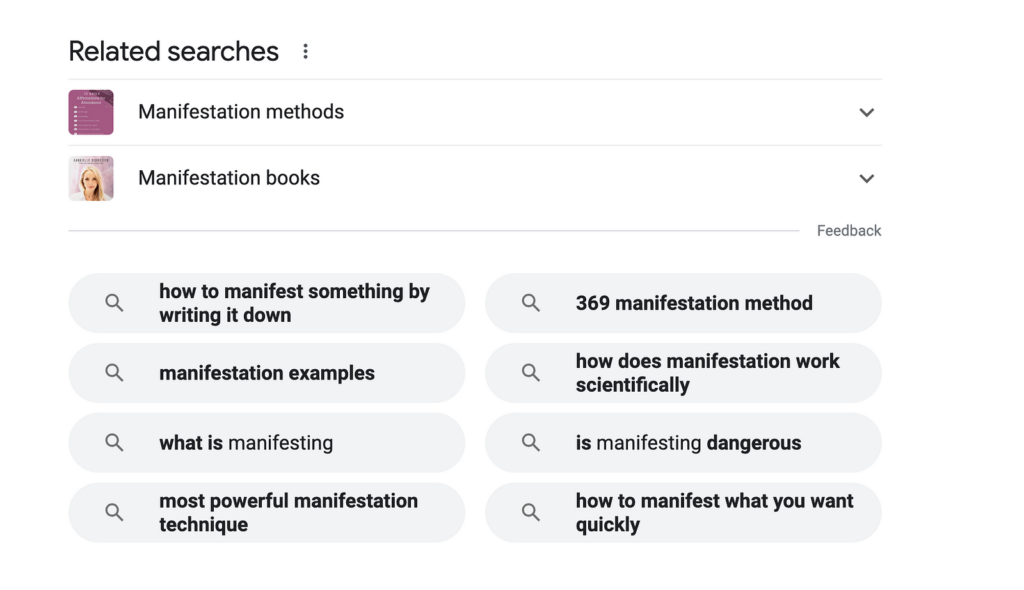
4. Craft A Compelling Page Headline and Title
The importance of compelling headlines and titles cannot be overstated when creating digital content. The headline of your blog post or page plays a significant role in search engine rankings and helps people determine if your content aligns with what they are searching for.
Tips for Crafting Compelling Headlines (H1):
- Incorporate your keyword strategically. Include your target keyword in your headline, preferably near the beginning, to signal relevance to search engines and users.
- Meet search intent. Craft headlines that directly address the search intent behind a user’s query. Understanding what users are looking for and aligning your headline with their expectations increases the chances of capturing their attention.
- Use action words. Employ action-oriented language to inspire readers to take action. Strong verbs and persuasive language can spur readers to engage with your content.
- Keep it simple and clear: Avoid being overly clever or cryptic with your headlines. Keep them simple and straightforward, ensuring that users immediately understand what your content offers.
The Power of Optimized Title Tags
Optimizing your page title is equally important. Page titles (or title tags) serve as the headline for your webpage on search engine results pages and also appear in the browser tab. (Essentially, your page title is what people see on Google, whereas your page headline (H1) appears on the actual page of your content.
Best Practices For Writing Page Titles
Here are three best practices for your page title that will significantly enhance the visibility and clickability of your content:
- Like your page headline, include your keyword in the title as close to the beginning as possible to emphasize relevance.
- Aim for a length between 50 to 60 characters to ensure it displays fully on desktop and mobile search results.
- Treat your title as a compelling call to action to entice users to click on your page.
You can use this title tag preview tool to see how your page title will look on results pages.
The Impact of First Impressions
The biggest takeaway when it comes to page headlines and titles is that first impressions matter, both in real life and in creating online content. Captivating headlines and titles is your gateway to capturing a user’s attention.
Consider the following page’s headline below.

Imagine you are searching for “how to manifest your soul’s purpose” and you land on this page with the headline: “Manifesting / Soul Purpose”
This headline gives some idea about what the page is about but it is not specific enough for you to know if you are getting the answer to what you searched for.
Compare this revision:
- “Harnessing the Power of Manifestation: How To Uncover Your Soul’s True Calling and Embrace a Purposeful Journey”
Which one is more likely to keep you on the page? Which will make you hit the back button?
Now, consider the following page’s title below.

Imagine searching on Google for “eft tapping for trauma” and you come across this result with the title: “Healing Trauma With EFT Tapping: A Comprehensive Approach”
Ok, not bad. This title features relevant keywords and might pique your interest, but the title can be much more appealing and impactful. Additionally, the title exceeds Google’s character count, so the word “Approach” gets clipped.
Compare this revision:
- “EFT Mastery: Transform Your Trauma Through Tapping”
Which one would you click on? The latter is action-oriented, concise, and promises a specific transformative benefit that arouses curiosity.
5. Use Your Keywords Strategically In Your Content
When writing meditation or spiritually-themed content, you want to strategically incorporate relevant keywords around your topic naturally throughout the post. This makes it easier for search engines to understand the topic and focus of your content while attracting the right type of traffic to your page.
Tips For Strategically Using Keywords:
- Maintain a natural keyword flow. Integrate keywords seamlessly within your content to maintain readability and avoid keyword stuffing.
- Place keywords contextually. Incorporate keywords in relevant areas such as titles, headlines, subheadings, and introductory and concluding paragraphs to enhance their contextual relevance.
- Utilize synonyms and variations. Expand your keyword strategy by incorporating synonyms and variations of your target keywords. This adds diversity to your content and prevents keyword redundancy.
Example: “Finding Inner Peace Through Daily Meditation”
Take a hypothetical post titled: “Finding Inner Peace Through Daily Meditation” about cultivating inner peace through a daily meditation practice, you could strategically use keywords:
- In the post title and headline (H1), include the target main keyword “daily meditation.”
- In the opening paragraph, mention synonyms like “quiet contemplation” and “mindfulness routine.”
- Use related keywords in subheadings, like “Establishing a consistent meditation habit”, and “Choosing the best time of day to meditate.”
- Near the end, incorporate semantic variations like “developing an ongoing meditation practice” and “making meditation a part of your everyday self-care ritual”
- Include the focus main keyword again in the conclusion paragraph.
6. Structure Your Page for Readability (and SEO)
SEO content writing is about striking the perfect balance between readability and creating high-quality and valuable content. In other words, it’s about providing the best possible user experience.
How overwhelmed do you feel when you do a Google search and land on a page with long, unbroken chunks of text? You likely hit the back button to find something easier to consume. This is exactly what you want to guard against when structuring your content whether it’s for a blog post, a guided meditation, or a landing page about your online course or coaching program. Instead, you want visitors to easily find and consume the wisdom and valuable insights from your content as quickly and easily as possible.
Best Practices For Structuring Your Content
- Write for clarity, not cleverness. Use straightforward language, concise sentences, and relevant examples to effectively convey your message. Avoid jargon or complicated terminology that may confuse your intended audience.
- Break your content into descriptive subheadings (H2, H3, etc.). This helps readers navigate your content easily and allows search engines to understand the structure efficiently.
- Use bullet points, numbered lists, and blockquotes to make your content easier to digest, especially for readers who skim through your content.
- Leverage visual content to increase engagement. Studies show 90% of information transmitted to the brain is visual and it processes visual content 60,000 times faster than text.
Speaking of which, here are some ideas to leverage visual content:
- Always include a featured image on every page. Aim for real photos and personal photos over stock images when available.
- Add infographics to present complex information in a visually appealing and digestible format. For example: an anatomical diagram of chakra locations or an illustrated guide to proper meditation mudras
- Always consider adding a video or a sneak peek of one of your paid programs or courses when you can.

7. Optimize Your Students’ And Clients’ Learning Experience
Creating an optimal user experience is vital for meditation and spirituality websites. Your students, readers, and community members need to easily navigate your content, offerings, and resources.
Put yourself in the shoes of those coming to deepen their practice. Consider their journey from initial visit to becoming an engaged member of your audience. If any part of this flow causes frustration, they may click away permanently.
This means consciously designing your web content for simplicity, seamless interactions, and value delivery. However, you don’t need to master complex web design. Instead, follow the tips listed below and keep in mind two important points:
- Be intentional with the content you put on your page by ensuring it always solves key student needs and questions.
- Always make it obvious to your users what the next action you want them to take.
Tips To Optimize User Experience For SEO
- Include clear and compelling calls-to-action (CTAs). Guide your audience toward the desired actions by including persuasive CTAs within your content. Whether it’s encouraging them to subscribe to your email list, download a freebie, inquire about a product, or schedule a call, a well-crafted CTA can significantly impact conversion rates.
- Incorporate social proof. Add social proof elements such as testimonials, case studies, or client reviews to build trust and credibility. Social proof can influence someone’s decision to take action and increase their confidence in your offers and brand.
- Regularly update and keep your content up to date. Regularly review and optimize your existing content based on new modalities, practices, and insights in your specialized area or changes in search trends and your audience’s needs. This ensures that your content remains relevant, valuable, and appealing to both users and search engines.
- Keep in mind the experience on mobile. While mobile optimization is more of a technical aspect, when planning your webpage content, you should always consider how it will display and be consumed on mobile devices, ensuring a seamless user experience. In 2023, mobile devices accounted for 58% of global website traffic.
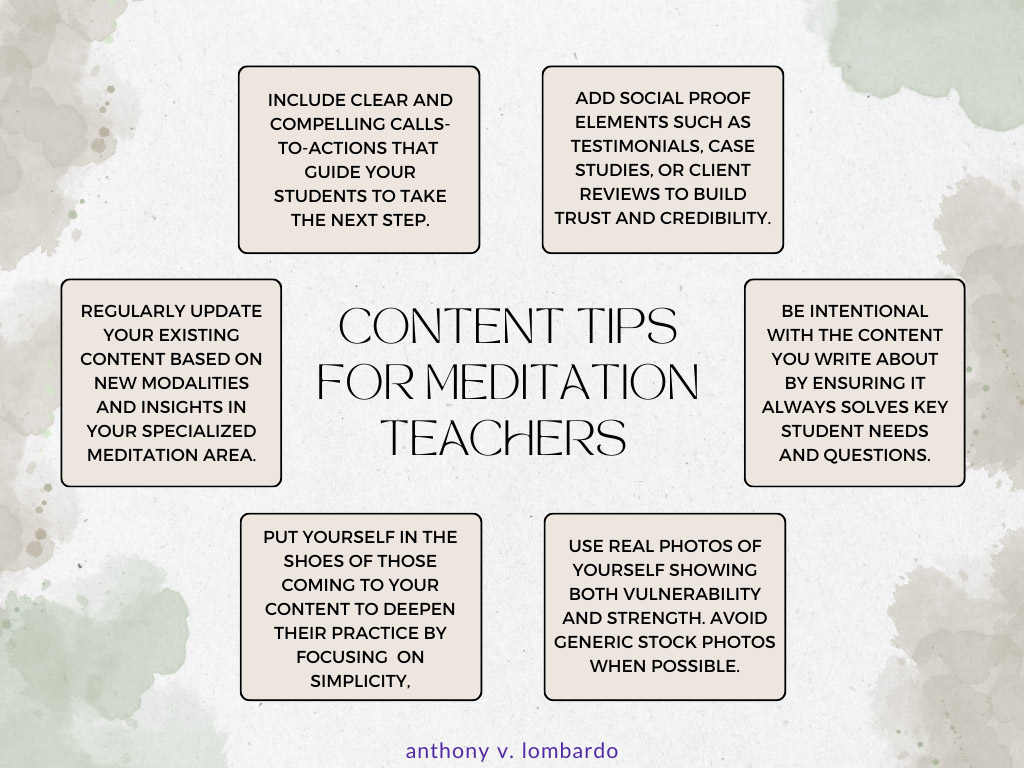
8. Craft Enticing Meta Descriptions
The meta description is a brief summary or snippet of text that appears below the clickable title (see page title in #4 on this list) in Google search results pages. While optimizing meta descriptions doesn’t directly impact rankings, it plays a vital role in increasing click-through rates (CTR) and signaling the value of your content to Google. A well-crafted, enticing meta description can be the difference in why someone chooses your page over others.
It helps your meditation content stand out in the crowded spiritual landscape.
Best Practices For Crafting Meta Descriptions
- Provide a compelling and concise description of the content’s relevance and value.
- Keep the length under 160 characters to ensure it displays fully in search results. You can use this quick tool to see how your meta-description will look in search results.
- Write in an enticing manner to encourage searchers to click on your page.
- Include your target keywords naturally but prioritize readability and clarity.
- Analyze the meta description of pages similar to yours for insights and inspiration.
Meta Description Working Example
Now, let’s revisit the example on EFT where we improved the page title on the Google search result page. Take a look at the meta description highlighted below.

This is exactly what you don’t want to do with your meta description. This page lacks a real meta description set by the content author. In this case, Google displays any random snippet of text from the page’s content as the meta description—which in most cases doesn’t accurately convey the page’s relevance and value.
A possible effective meta description for this page could be: “Discover the transformative power of EFT tapping in trauma healing. Learn to release emotional distress and foster resilience through a comprehensive approach.”
9. Seamlessly Link to Helpful Internal Content
Including relevant links to other pages on your site remains an important SEO strategy. This signals to search engines the interconnected value across your content.
However, links must enhance user experience, not disrupt it. So, it’s important not to overdo it. Internal links should point readers to complementary resources that deepen the learning journey or solutions mentioned in your current content.
For example, at natural opportunities in your educational content (blog posts, videos, podcasts, etc.) link to related:
- Posts expanding on key ideas
- Downloadable meditation resources or practices
- Your course or program aligned with the discussed topic
- Your contact page or calendar to book a call.
Think of internal links as “breadcrumbs” you leave for visitors, inviting them to explore more of your offerings.
When done strategically, linking provides a better overall experience for your website visitors. It shows search engines the informational flow across your content and your dedication to being a helpful resource on meditation, mindfulness, and spirituality.
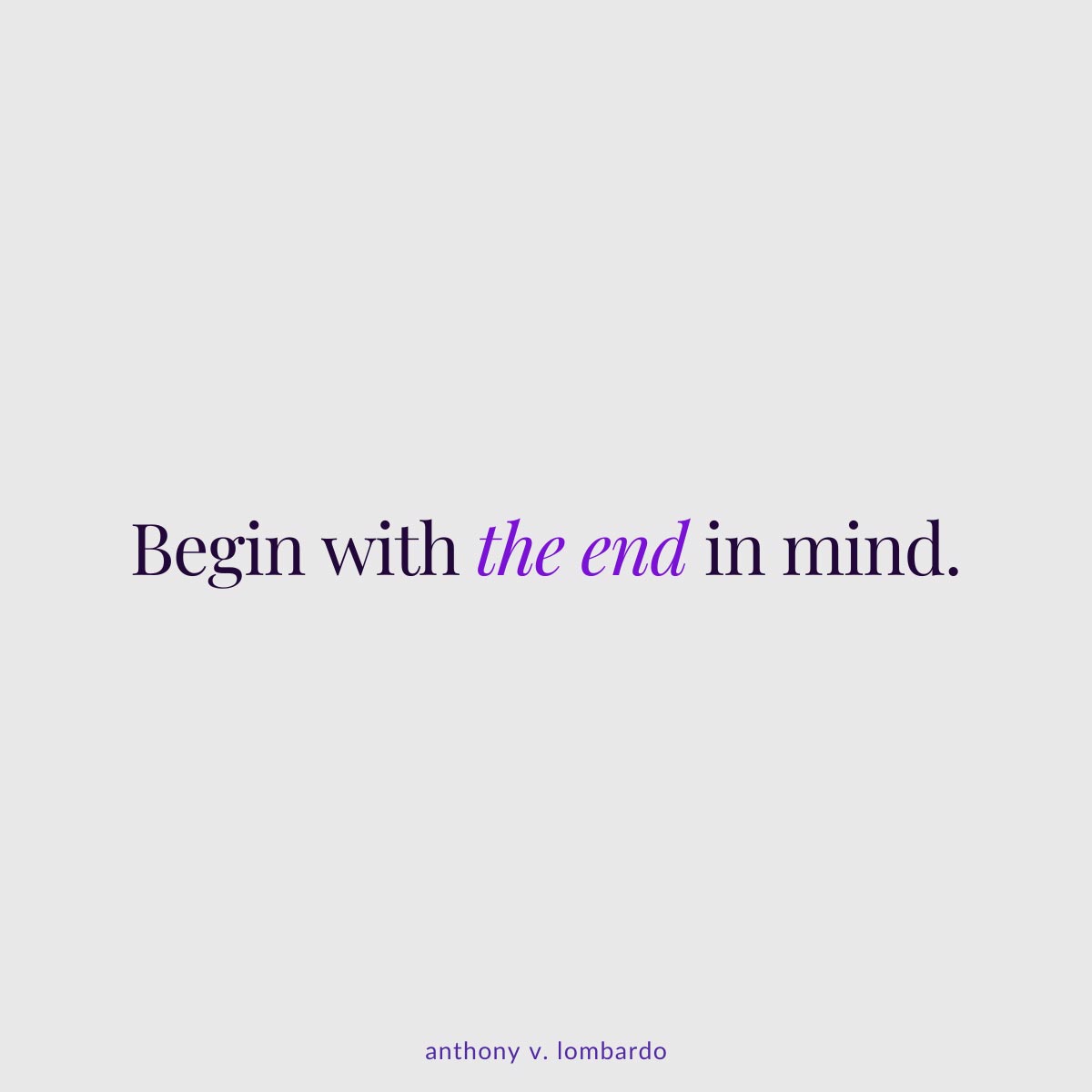
10. Create Purposeful Content That Uplifts and Inspires
Now that we’ve explored SEO content writing, we’ve spent a lot of time on tips to get your content to rank better. However, better ranking is a byproduct of focusing on creating quality content (over quantity).
Creating great resources requires understanding what your audience of spiritual seekers needs during their journey — whether beginners starting out or advanced students progressing.
Remember, SEO content writing should result in both rankings and conversions. If you get one without the other, you miss opportunities.
A good strategy is to start with the end in mind.
High-value, quality content is geared toward achieving a particular result. That’s why every piece of content you create should serve a purpose — it must have an intention.
Some of the common goals you can set for your meditation and spiritual content include:
- Booking a call
- Brand awareness
- Newsletter sign-ups
- Providing a free resource
- Building trust and credibility
- Promoting a live class or event
- Educating on your course/program
As a meditation teacher or spiritual content creator, the ultimate objective of content marketing is to guide potential students and clients along their journey and motivate them to take desired actions. To accomplish this, it is vital to define the purpose of your individual content pieces from the outset. This approach will help you focus on the right keywords, fulfill search intent, and create content that converts.
As a result, this will align your content strategy with Google’s ultimate goal of delivering highly relevant and reliable search results tailored to each user’s specific needs.
Are you a meditation teacher or spiritual guide and need help with your SEO or email marketing?
I’d love to work with you to help you spread the light and share your message to reach those who need it. Let’s jump on a quick call and have a friendly chat.
SEO Content Bundle For Meditation Teachers & Spiritual Content Creators
Master the art and science of producing online content that resonates with real human beings while being easily discoverable online. Download today and get a 66% discount. The bundle includes:
- The Ultimate Guide To SEO Content Writing
- 10 Power Packed ChatGPT Prompts For Content Creation and Marketing
- 31-Step SEO Blog Post Checklist
Join the tribe of Conscious Creators!
Walking the spiritual path?
Sign up for the You Are A Conscious Creator Newsletter which curates hand-picked wisdom and insights for living a more conscious and meaningful life.



